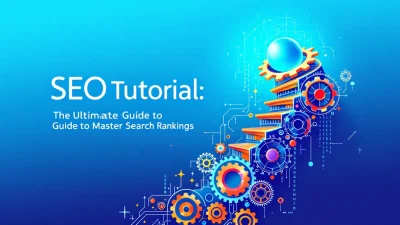Ever wonder what lies behind the curtain of successful online content? Enter the world of understanding keywords. This foundational element is the secret sauce in mastering SEO, transforming bland content into a traffic magnet. Whether you’re an IT professional, developer, digital marketer, or tech enthusiast, understanding keyword strategy is a game-changer for your digital footprint.
In this guide, we’ll unravel the mystery of keywords and equip you with practical how-to steps to elevate your SEO game. Get ready to unlock the potential of keyword optimization and drive substantial, targeted traffic to your site. Let’s delve into the heart of effective digital marketing. Here’s what awaits you:
Table of Contents
- Defining SEO Keywords
- The Role of Keywords in SEO
- Keyword Research Tools and Techniques
- How to Choose the Right Keywords
- Implementing Keywords in Content
- Measuring Keyword Effectiveness
- FAQs
- Conclusion: Mastering Your Keyword Strategy
Defining SEO Keywords
Understanding keywords is pivotal in the world of SEO. They connect your content with what users are searching for. But defining these keywords is an art as much as it is a science. So, how important are keywords in SEO? Let’s break it down.
- Know Your Niche: Dive deep into your niche to discover what your audience is searching for. Use tools like BrightEdge to explore keyword trends.
- Identify Core Topics: Start with broad ideas related to your business. These will transform into important keywords. Consider what questions your potential customers might ask. This step will set the foundation for your SEO strategy.
- Expand with Keyword Research Tools: Use tools like Google Keyword Planner and others mentioned in Venveo to find variations of your core topics.
- Analyze Search Intent: It’s crucial to align your keywords with user intent. This ensures that your content meets the specific needs of searchers, improving engagement.
- Refine and Organize: Once you have a list, prioritize keywords by difficulty and search volume. This will help you focus your efforts on the most effective terms.
Expert Tip: Consistently review and update your keyword list to stay ahead of changing trends.
You might want to explore our SEO and Content Marketing Guide for a comprehensive look at mastering digital success through keyword strategy and beyond.
The importance of continually optimizing and understanding keywords cannot be overstated.
Types of SEO Keywords
Keywords aren’t one-size-fits-all. Typically, they are categorized into three types: short-tail, medium-tail, and long-tail. Understanding these can drastically improve your reach:
- Short-Tail Keywords (1-2 words): Broad terms with high volume, but fierce competition. Example: ‘SEO strategies.’
- Medium-Tail Keywords (3-4 words): More specific and usually easier to rank for. Example: ‘basic SEO strategies.’
- Long-Tail Keywords (5+ words): Hyper-specific phrases that attract a targeted audience. Example: ‘how to create basic SEO strategies.’
For more insights into what are keywords and why they matter, check out this article by Bruce Clay.
The Role of Keywords in SEO
Keywords are the linchpin of successful SEO strategies. But why are they so essential? Simply put, understanding keywords is crucial because they connect your content with what people search for online. If you want to dive deeper into SEO, check out our SEO and Content Marketing: The Ultimate Guide to Mastering Digital Success.
Why Keywords Matter
Ever wondered how important are keywords in SEO? Keywords are like road signs for search engines; they guide the algorithms to better understand the content of your site. By strategically placing important keywords in your content, visitors can easily find your page. This leads to higher visibility, more traffic, and potentially better conversion rates.
- Increase Visibility: Keywords make your content more discoverable by search engines.
- Boost Relevance: They ensure your content aligns with the user’s search intent.
- Improve Ranking: Properly optimized keywords can enhance your content’s position on search engine results pages.
How to Use Keywords Effectively
Here’s how to leverage understanding keywords for better SEO:
- Research Thoroughly: Use tools like Google Keyword Planner to find what your audience is searching for. Explore more about what keywords are and how they operate.
- Optimize Placement: Include keywords in meta tags, headings, and naturally within your content.
- Consistent Monitoring: Regularly analyze your performance with the help of analytics tools to tweak and refine your strategy.
Key benefit of using understanding keywords: Enhances user engagement by aligning content with audience interests.
For further reading on why keywords matter, explore this comprehensive guide on keywords.
Keyword Research Tools and Techniques
Mastering understanding keywords is pivotal for boosting your SEO game. This journey begins with choosing the right tools and techniques to unearth those pivotal words that make or break your content’s visibility. Below, discover how to effectively navigate this crucial step.
- Identify Your Niche: Start by clearly defining the niche market you want to target. Understand who your audience is and what they’re searching for. Tools like Google Keyword Planner or Ahrefs can provide insights into popular search terms related to your industry.
- Use Keyword Research Tools: Leverage tools like SEMrush, Ubersuggest, and Moz Keyword Explorer. These platforms offer a wealth of data, including search volume, competitive analysis, and keyword difficulty, ensuring you focus on important keywords that align with your content goals.
- Analyze the Competition: Check what keywords your competitors rank for and identify gaps you can fill. Tools like Ahrefs offer competitor analysis features that highlight untapped keyword opportunities.
- Monitor Trends: Use Google Trends to observe how keywords fluctuate over time. This can help you adjust your keyword strategy according to seasonality or emerging trends.
Wondering how important are keywords in SEO? They are the lifeline of your digital strategy, guiding search engines and potential customers to your content. Remember, understanding keywords is not merely about selecting words; it’s about making informed choices that enhance audience connection and drive traffic.
Key benefit of using understanding keywords is a higher ranking in search engine results, driving more qualified traffic to your content.
How to Choose the Right Keywords
Choosing the right keywords is an essential step in mastering SEO. Without the perfect keywords, your content won’t reach its full potential. But where do you start? Let’s break it down into simple steps that make understanding keywords easier.
- Identify Your Audience: Understand who will read your content. Use tools and research to find out what important keywords they search for.
- Brainstorm Keyword Ideas: Think about how important are keywords in SEO and consider variations that align with your content. Use words and phrases your audience likely uses.
- Use Keyword Research Tools: Utilize tools like Google Keyword Planner to analyze search volume and relevance. These tools can reveal new opportunities and trends. For more insights, explore Bruce Clay’s comprehensive guide on discovering keywords.
- Evaluate Competitors: Look at what keywords competitors rank for. This helps you find gaps in the market. It’s also a strategic way to understand how they matter.
- Select Long-tail Keywords: These are specific phrases that attract more targeted traffic. They’re often less competitive and more precise.
- Integrate and Adapt: Add selected keywords naturally into your content. And remember, SEO is not static. Continuously refine your tactics. Learn more strategies at SEO and Content Marketing: The Ultimate Guide to Mastering Digital Success.
Key benefit of understanding keywords is unlocking the potential of your content.
Implementing Keywords in Content
Have you ever wondered how important are keywords in SEO? As crucial as they are, implementing them effectively can be a game-changer. Learning how to do this can significantly boost your content’s performance.
- Research Keywords Thoroughly: Begin by understanding keywords that align with your content’s intent. Use tools like Bruce Clay’s guide to gather significant insights.
- Place Keywords Naturally: Integrate keywords seamlessly into the text. Prioritize readability over repetition. Follow this approach to avoid keyword stuffing, which can be detrimental.
- Use Variations and LSI Keywords: Variations add context and prevent monotony. Tools like Venveo’s comprehensive overview can offer further guidance.
- Optimize Meta Elements: Ensure that title tags, meta descriptions, and image alt text also include your important keywords.
In essence, mastering the way of understanding keywords can elevate your content’s visibility. Want to dive deeper into this topic? Explore our Ultimate Guide to Mastering Digital Success.
Measuring Keyword Effectiveness
When diving into the realm of SEO, understanding keywords is crucial. But how can you measure their effectiveness? Let’s explore simple and effective methods to ensure your keywords are driving SEO success.
Track Traffic Changes
- Use Google Analytics: Monitor the influx of traffic from your targeted keywords. A rise in organic visits signals good keyword choice.
- Check Your SERP Position: Tools like BrightEdge help track where your keywords rank in search results.
Analyze Conversion Rates
Having the right visitors is more important than sheer numbers. Evaluate how many visitors from those keywords take action—be it subscribing, contacting, or purchasing. If conversions rise, your keywords are truly effective.
Monitor Page Engagement
Engagement metrics like bounce rates and average session duration tell stories. High bounce rates may mean you need better-aligned important keywords. Engage users by providing relevant content that matches their search intent.
For a comprehensive dive into this topic, explore our SEO and Content Marketing: The Ultimate Guide to Mastering Digital Success.
Understanding keywords helps tailor your SEO strategy, but measuring effectiveness ensures continuous improvement.
FAQs
What is the Importance of Understanding Keywords in SEO?
Understanding keywords is crucial as they form the foundation of your SEO strategy. They help search engines recognize what your content is about, ensuring it reaches the right audience. Explore more about keyword importance on BrightEdge.
How Important Are Targeted Keywords?
Targeted keywords increase your content’s visibility and relevance. By focusing on these, you can attract your ideal audience and improve your site’s ranking. Discover why keywords matter at Bruce Clay Blog.
Can Keywords Impact Website Traffic?
Yes, effectively using important keywords can significantly boost website traffic by aligning content with user search intents. To master this strategy, visit our internal guide on SEO and Content Marketing.
Is it Necessary to Update Keywords Regularly?
Absolutely! Regular updates ensure you stay relevant to both evolving search trends and your audience’s changing needs. Discover how to use them effectively at Venveo.
How Do I Start Mastering Keyword Research?
Begin by understanding your target audience and identifying search terms they frequently use. Use tools like Google Keyword Planner to refine these insights and start building a solid SEO strategy.
Conclusion: Mastering Your Keyword Strategy
Perfecting your keywords can significantly elevate your SEO game. Having explored the many facets of understanding keywords and their role, it’s clear how vital they are to digital success. Creating a strategy that blends important keywords with well-rounded content will unlock more traffic and engagement. Keywords aren’t just words—they’re powerhouses that fuel your SEO and Content Marketing strategy.
Take what you’ve learned on how important keywords are in SEO, and apply them to create optimized content that speaks to user intent. Your journey towards mastering keyword strategy doesn’t end here. By continuously experimenting and analyzing, you’ll develop a robust mechanism that evolves alongside ever-changing SEO paradigms.



